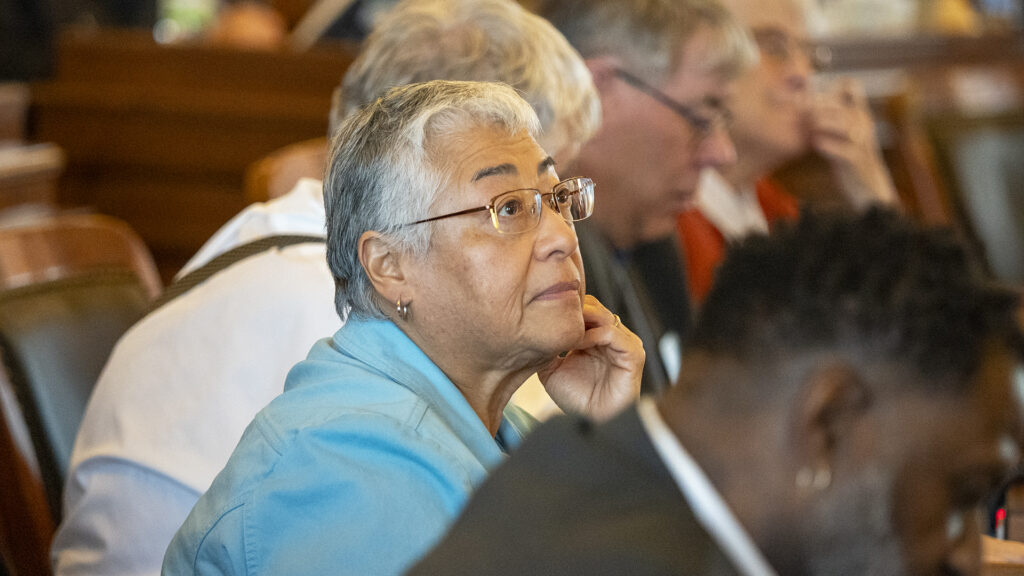Rep. Susan Ruiz, a Shawnee Democrat, on April 10, 2025, on the House floor condemned a veto override of legislation allowing LGBTQ+ kids in foster care to be placed in religious households that may disagree with their gender identity or sexual orientation. (Sherman Smith/Kansas Reflector)
TOPEKA — The way Kansas LGBTQ+ youths in foster care are placed into homes could change after lawmakers forced a bill into law that permits foster children to be placed with families who don’t affirm a child’s sexual orientation or gender identity based on the parents’ religious or moral beliefs.
Republicans argued that Kansas is at risk of losing needed foster families, and the bill prevents the state from discriminating against parents, even though their beliefs might conflict with a child’s sexuality or gender identity.
Gov. Laura Kelly, a Democrat, vetoed the bill April 7, characterizing it as a departure from the Kansas Department for Children and Families’ adherence to the “best interest of the child” standard.
“Legislation like this detracts from this standard and stands in the way of best serving those in the child welfare system,” Kelly wrote in her veto message.
She also feared the legislation could open the state up to lawsuits.
The House overrode House Bill 2311 Thursday in an 87-38 vote, with Emporia Republican Rep. Mark Schreiber joining Democrats in opposition. Senate Republicans overrode it the same day in a 31-9 vote along party lines.
Kerrie Lonard of the Kansas Office of the Child Advocate said her office recognizes the proponents’ intent, the concerns of those opposed and the possibility for unintended consequences.
It will be “cognizant,” Lonard said, of the implementation of HB 2311, which includes “recruitment and training of foster parents, and in placement decisions, specific to increased placement options or potential harm or actions that do not maintain best interest of the child as the guiding center.”
Foster care youths are entitled to basic rights under the Gail Finney Memorial Foster Care Bill of Rights, which was codified in 2023.
Embedded in that bill of rights, Lonard said, is the right to “live in a safe, comfortable placement,” to “be treated with respect” and to live with “someone from such child’s community with similar religious beliefs or ethnic heritage.”
The office “will advocate that placement decisions are made with respect to foster children’s statutorily protected rights and in their best interests,” Lonard said.
HB 2311, which is set to go into law as soon as it is published in the Kansas Register, forbids the state’s foster care agency from creating policies for a child’s placement, custody or adoption that require a foster parent to “affirm, accept or support” a child’s sexual orientation or gender identity that may conflict with the parents’ religious or moral beliefs. It bars rejections of eligible foster parents based on their religious or moral beliefs on sexuality or gender.
The state cannot reject parents if they intend “to guide or instruct a child” consistent with their beliefs, the bill said.
People can sue the agency for damages and attorney fees if barriers to foster care or adoption are enforced after July 1.
The Kansas foster care system has endured a rocky history, and it is currently measuring court-mandated improvements to course correct. Brenna Visocsky of the Kansas Appleseed Center for Law and Justice, which submitted testimony to the House Committee on Child Welfare, said HB 2311 doesn’t fix any of the state’s prevailing problems. She said it furthers them instead.
“Considering that conversion therapy is still legal in this state, there is the potential for serious harm coming to LGBTQ children placed with anti-LGBTQ foster parents,” said Visocsky.
Alliance Defending Freedom, a national conservative Christian legal advocacy group, applauded the effort and Kansas Family Voice, a Christian organization that lobbies on abortion, sexuality and parental rights.
Greg Chafuen, senior counsel for the alliance, said other states have put politics over people when it comes to religious families in the foster care system, but not Kansas.
“The Kansas Legislature correctly voted to override Gov. Kelly’s misguided veto,” he said in a statement. “This is a critical step to prioritize the well-being of kids by prohibiting state and local government officials from discriminating against adoption and foster care providers and parents simply because of their religious beliefs and moral convictions.”
Rep. Jarrod Ousley, a Merriam Democrat, said the bill puts the foster parents’ sincerely held religious beliefs ahead of kids’ sexual orientation or gender identity.
“This was a bad bill when we heard it last time,” Ousley said on the House floor. “This sends a terrible signal to a vulnerable population in the state of Kansas.
Rep. Susan Ruiz, a Shawnee Democrat, rebutted the idea that religious freedoms are under attack.
“Religious liberty is well-protected in Kansas,” she said. “What is not well protected in Kansas are children and their rights.”
The bill isn’t needed, she said.
“The purpose of the bill really is to discriminate against a certain child,” Ruiz said, “a child that may be talking, speaking about, that they may be transgender.”
Read the full article here


